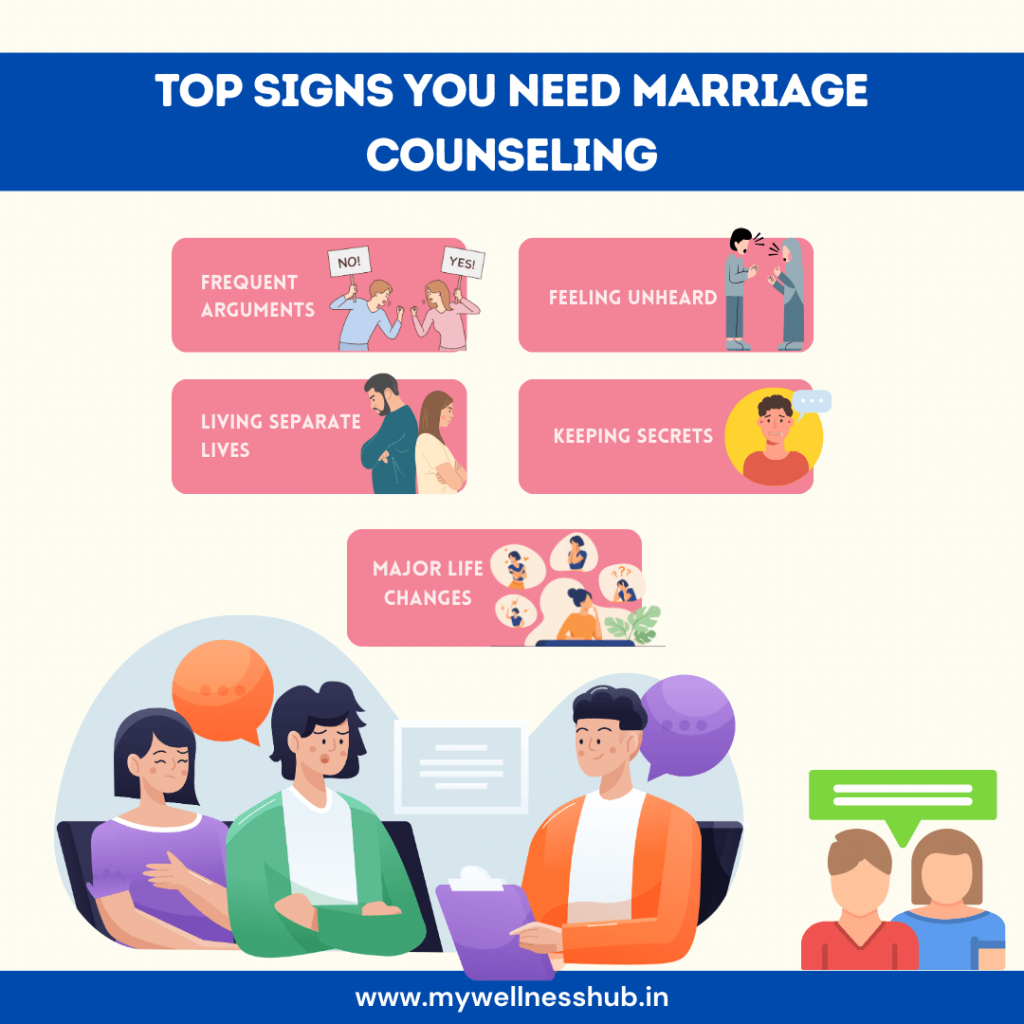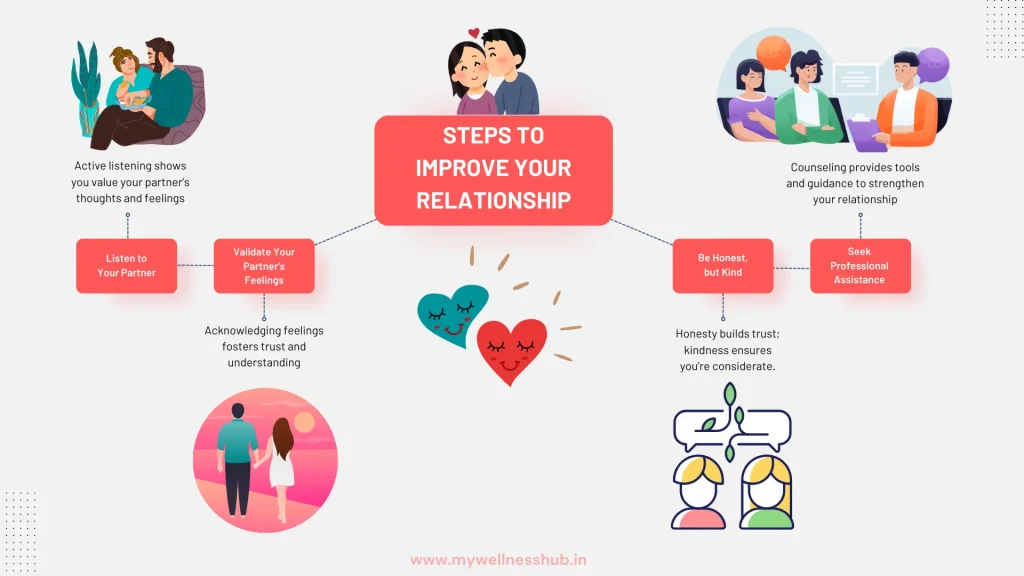Marriage Counseling: Signs It Can Save You
By Prapoorna M
Last Updated: July 11, 2024
Every couple experiences challenges, but recognizing when to seek professional help can be pivotal. If you’re noticing persistent issues that strain your connection, marriage counseling might be a beneficial step. Far from admitting defeat, opting for therapy is a proactive approach to fortify your relationship. Through counseling, many couples improve their communication, resolve conflicts, and gain deeper mutual understanding. It’s not just about fixing problems—it’s about enhancing intimacy and joy in your partnership. Embracing professional guidance can help you manage your relationship’s complexities, ultimately fostering a happier and more resilient union.

Book Your Marriage Counselling Now
Frequent Arguments Instead of Calm Communication
Do you find that every conversation with your spouse turns into an argument? Constant arguing is often a sign of deeper issues in a relationship. While occasional disagreements are normal, frequent and unresolved arguments can indicate underlying problems that need attention.
When arguments replace calm communication, it’s usually because of ineffective communication patterns. Name-calling, blaming, and yelling are all signs of unhealthy communication. These patterns not only hurt your partner but also erode trust and intimacy in your relationship. Over time, this can lead to feelings of resentment and disconnection.
Learning effective communication skills is essential to overcoming these challenges. Couples counseling can provide a safe space to explore these issues and develop better ways to communicate. By focusing on active listening and expressing yourself without attacking your partner, you can begin to resolve conflicts more constructively.
For example, instead of saying, “You never listen to me,” try saying, “I feel unheard when I’m sharing my thoughts.” This shift in language can reduce defensiveness and open up a more productive dialogue. Counseling can help you and your partner practice these skills, making it easier to navigate disagreements without them escalating into full-blown arguments.
Also Read: How to Know If You Need Marriage Counselling? and is it Effective?
Living Separate Lives
Have you noticed that you and your spouse seem more like roommates than partners? Living separate lives is a clear sign of emotional and physical distance in a relationship. This can manifest in many ways, such as spending little to no time together, having separate social lives, or feeling disconnected even when you are physically present with each other.
Life changes and busy schedules can often lead to couples drifting apart. Work commitments, children, and daily responsibilities can consume your time and energy, leaving little room for nurturing your relationship. Over time, this can create a sense of isolation and loneliness, even within the context of a marriage.
It’s essential to recognize these signs early. When partners live parallel lives, the emotional gap between them widens, making it harder to reconnect. This is where couples counseling can make a significant difference. A counselor can help you both identify the root causes of your disconnection and provide strategies to bridge the gap.
Keeping Secrets from Each Other
Secrecy in a relationship can be incredibly damaging. When you or your partner start keeping secrets, it undermines the foundation of trust that a healthy relationship relies on. Whether these secrets are about finances, feelings, or past actions, they create barriers to true intimacy and connection.
The dangers of secrecy are profound. Secrets erode trust and intimacy, two critical components of a strong relationship. When trust is broken, it can lead to feelings of betrayal, resentment, and isolation. You might start questioning your partner’s honesty and intentions, which can spiral into constant suspicion and anxiety. This erosion of trust makes it difficult to communicate openly and honestly, further deepening the divide between you and your partner.
Counseling can play a crucial role in addressing the issues that lead to secrecy. A skilled therapist can help you and your partner uncover the reasons behind the secrets. Often, these reasons stem from fear of judgment, shame, or past traumas. By exploring these underlying issues in a safe and supportive environment, you can begin to understand and empathize with each other.
Know more about our article on REBUILDING TRUST IN RELATIONSHIPS
Major Life Changes Causing Stress
Significant life events, whether positive or negative, can put a tremendous strain on a relationship. These events often bring about changes that disrupt your daily routine and emotional balance, making it challenging to maintain harmony with your partner.
For instance, welcoming a new baby is a joyful experience, but it also comes with sleepless nights, new responsibilities, and adjustments to your lifestyle. Similarly, moving to a new house can be exciting but also stressful due to the logistics involved and the emotional toll of leaving familiar surroundings. On the other hand, negative events such as job loss, serious illness, or the death of a loved one can create intense stress and uncertainty, which can strain your relationship.
These major life changes can lead to feelings of overwhelm, anxiety, and resentment if not properly managed. It’s common for couples to struggle with communication and support during these times, as each partner may be dealing with their own emotional responses.
Common Life Stressors and Counseling Strategies
| Life Stressor | Counseling Strategy |
|---|---|
| Job Loss | Offers parenting support, helps balance new responsibilities and provides strategies to maintain the couple’s connection. |
| New Baby | Offers parenting support, helps balance new responsibilities, and provides strategies to maintain the couple’s connection. |
| Moving House | Aids in coping with change, managing the stress of relocation, and maintaining an emotional connection with your partner. |
| Serious Illness | Provides emotional support, helps manage health-related stress, and offers strategies for dealing with caregiving roles. |
| Death of a Loved One | Provides financial stress management techniques and helps rebuild confidence and explore new career opportunities. |
Steps to Improve Your Relationship

Listen to Your Partner
Active listening is a cornerstone of any healthy relationship. When you listen to your partner without judgment or interruption, it shows that you value their thoughts and feelings. Here are some tips for effective listening:
- Make eye contact: This shows that you are fully engaged in the conversation.
- Avoid interrupting: Let your partner finish speaking before you respond. This allows them to fully express their thoughts.
- Show empathy: Try to understand your partner’s perspective and validate their feelings. Simple phrases like “I understand how you feel” can go a long way.
Validate Your Partner’s Feelings
Validation is about acknowledging your partner’s feelings as legitimate, even if you don’t necessarily agree with them. This is crucial for fostering trust and understanding in a relationship. Here’s how you can validate your partner:
- Acknowledge their emotions: Say things like, “I can see that you’re really upset about this.”
- Show empathy: Use empathetic statements such as, “That sounds really challenging. I’m sorry you’re going through this.”
- Avoid judgment: Validation doesn’t mean you have to agree. It means you recognize and respect your partner’s emotions.
Read more: Understanding and Managing Jealousy in Relationships
Be Honest, but Kind
Honesty is vital for trust and transparency in a relationship. However, it’s important to be honest in a kind and considerate manner. Here’s how to do it:
- Be truthful: Share your thoughts and feelings honestly, but avoid being harsh.
- Choose your words carefully: Use “I” statements instead of “you” statements to express your feelings without blaming your partner. For example, say, “I feel hurt when…” instead of “You always…”
- Be considerate: Think about how your words will affect your partner, and strive to communicate with kindness.
Seek Professional Assistance
Sometimes, the best step you can take is to seek help from a professional. A couples counselor can provide a neutral space for you and your partner to discuss your issues and work towards solutions. Here’s how counseling can help:
- Facilitate communication: A therapist can help you develop better communication skills, ensuring that both partners feel heard and understood.
- Address underlying issues: Counseling can uncover the root causes of your relationship problems and provide strategies to address them.
- Strengthen your bond: Through guided exercises and discussions, counseling can help you reconnect and build a stronger, more resilient relationship.
Signs You Need Marriage Counseling and How Counseling Helps
| Sign | How Counseling Helps |
|---|---|
| Frequent Arguments | Counseling teaches effective communication skills, helping couples resolve conflicts constructively. |
| Feeling Unheard | Therapists help partners understand and validate each other’s feelings, fostering mutual respect. |
| Living Separate Lives | Counseling helps partners reconnect both emotionally and physically, rebuilding intimacy. |
| Keeping Secrets | Therapy uncovers the reasons behind secrecy and helps rebuild trust through open communication. |
| Major Life Changes | Counseling provides strategies to cope with stress from significant life events together. |
Conclusion
Acknowledging the signs that indicate a need for marriage counseling is crucial for nurturing a healthier, more connected relationship. If you experience frequent disagreements, feel distant, or are undergoing significant life changes, consider this a prompt to seek professional help. Marriage counseling offers a pathway to enhance communication, foster mutual understanding, and strengthen your bond. Remember, seeking help is a courageous step towards a more harmonious future. For continued support and guidance, connect with Wellness Hub. Together, you can work towards a revitalized and fulfilling relationship.
Frequently Asked Questions:
1. How do you know if you need marriage counseling?
Recognizing frequent arguments, feelings of being unheard, living separate lives, keeping secrets, and stress from major life changes are key indicators that you might benefit from marriage counseling.
2. What are the signs that you and your spouse need counseling?
Signs include constant arguing, lack of communication, feeling disconnected, keeping secrets, and experiencing stress from major life events.
3. When should couples seek counseling?
Couples should seek counseling when they notice persistent issues that they can’t resolve on their own, such as communication problems, trust issues, or significant life stressors.
4. Why might you and your spouse benefit from counseling?
Counseling can help you improve communication, rebuild trust, address underlying issues, and provide strategies to manage stress and strengthen your relationship.
5. What are the benefits of marriage therapy?
Marriage therapy can enhance communication, resolve conflicts, rebuild trust, and strengthen the emotional bond between partners.
6. How can frequent arguments affect a marriage?
Frequent arguments can lead to feelings of resentment, erode trust, and create emotional distance, making it difficult to maintain a healthy relationship.
7. What does it mean to live separate lives in a marriage?
Living separate lives means that partners feel more like roommates than a couple, often due to busy schedules, lack of communication, or emotional distance.
8. How do secrets impact a marriage?
Keeping secrets undermines trust and intimacy, leading to feelings of betrayal and disconnection in a relationship.
9. How can major life changes cause stress in a marriage?
Major life changes like job loss, having a baby, or moving can create stress and disrupt the balance in a relationship, leading to conflicts and emotional strain.
10. How can couples counseling help with major life changes?
Counseling provides strategies to cope with stress, improve communication, and support each other through significant life transitions.
About the Author:
Prapoorna Mangalampalli
M.Sc., M.A., (Dual Masters in Psychology & English) – Counselor (6+ years of experience)
Prapoorna is a skilled counselor with dual Master’s degrees in Psychology and English. With more than six years of professional experience, she specializes in providing various types of counseling, including online Therapy , Marital , Relationship, child, family, and career counseling. Prapoorna is part of the Wellness Hub team, where she contributes significantly to their mission. She values a team-based approach and is committed to innovation, compassion, and the success of her clients. Her diverse educational background and extensive experience enable her to offer insightful and effective counseling services that positively impact individuals and families.
Book your Free Consultation Today
Parent/Caregiver Info:
Client’s Details:
* Error Message









